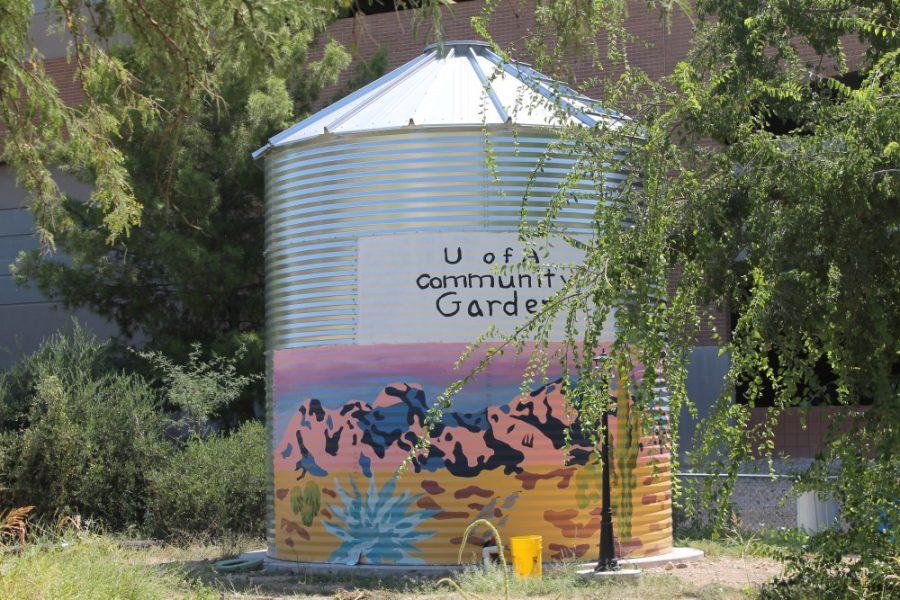In the last few years, University of Arizona students, staff and faculty have collaborated on different environmental projects, with some garnering national awards and recognition.
The university received a gold rating from the Association for the Advancement of Sustainability in Higher Education, recognition from the Environmental Protection Agency and recently finished No. 38 out of more than 200 universities by the Sierra Club’s Cool Schools 2017 rankings.
Efforts around campus by groups such as Students for Sustainability and UA Green Fund not only spread the word on sustainability, but also the practicality of being green.
Cameron Carlson, waste reduction committee chair for Students for Sustainability, said the group will work to divert waste from the campus and is cooperating with Waste Management to accomplish that goal.
“They have a local plant pretty close to campus but diverts all of the campus waste, and my committee, along with Students for Sustainability, will be volunteering at that plant to help them out in forwarding some of that waste,” Carlson said.
RELATED: Here’s how to have a sustainable semester
The presence of these groups shows the community real work is being done, according to Carlson.
“I definitely think it’s essential to a campus,” he said. “They’re going out and promoting not only sustainability but sustainability here on campus and really showing our campus community that we are here and we can make a difference.”
On May 1, Ann Weaver Hart, former UA president, wrote an executive letter to the Association for the Advancement of Sustainability in Higher Education, detailing the UA’s sustainability efforts. The letter read, “With over 1,600 undergraduate and graduate courses offered every two years that explore the intersectionality of large-scale environmental, social and economic challenges, sustainability is infused throughout UA’s curricula and academic culture.”
The UA has continued to add to its degree programs with the 2015 addition of Environmental Engineering, a course focused on the development of sustainable systems and the reusing of natural resources.
UA Green Fund, created in 2010, is made up of students who allocate $400,000 of student fees and apply it to different sustainability projects throughout campus. Grants are available to all who apply with their own proposals, with all grants awarded by a committee of ten graduate and undergraduate students.
Associated Students of the University of Arizona also has nine committees working in different areas to improve sustainability within the university community and Tucson.
With organizations around campus hosting annual events to get the community involved in doing more for the environment, Ben Champion, director for the Office of Sustainability, said a recent event the office helped coordinate accomplished much in its second year.
“We just wrapped up running the ‘Dodge a Dumpster’ and rummage sale programs where we were collecting waste from the residence hall move out process and reselling that,” Champion said. “That was a pretty good success for our second year; [it] grew quite tremendously and we’re looking forward to continuing that.”
The Parking and Transportation Services department also received awards for its sustainability plan to reduce harm to the environment by encouraging alternative methods to get to campus.
The department won the Best Workplaces for Commuters award, and according to the PTS website, the UA community has saved 192,644 pounds of pollution and 337,127 gallons of gasoline by not driving alone at least one day a week.
Adriana Zuniga, a senior lecturer in the College of Architecture, Planning and Landscape, works with students on sustainable environments. She said it will take effort from everyone to help combat climate change due to the way we use energy and the growing population throughout the world.
RELATED: One week of eating vegan
“No matter what discipline you are coming from, the whole of humanity needs to be more sustainable if we want to survive,” she said. “So it’s in the way we eat, [the way] we consume and produce energy, the way we treat our equity issues. It’s in our whole way of existence to be geared toward more sustainable approaches.”
Champion said extreme weather events are evidence that our environments have changed.
“We’ve got a situation where, due to human activity, our environment is changing very rapidly and our ability as a society to adapt to those changes is based on us being forward-thinking and trying to understand what’s coming,” he said.
Follow Shaq Davis on Twitter










